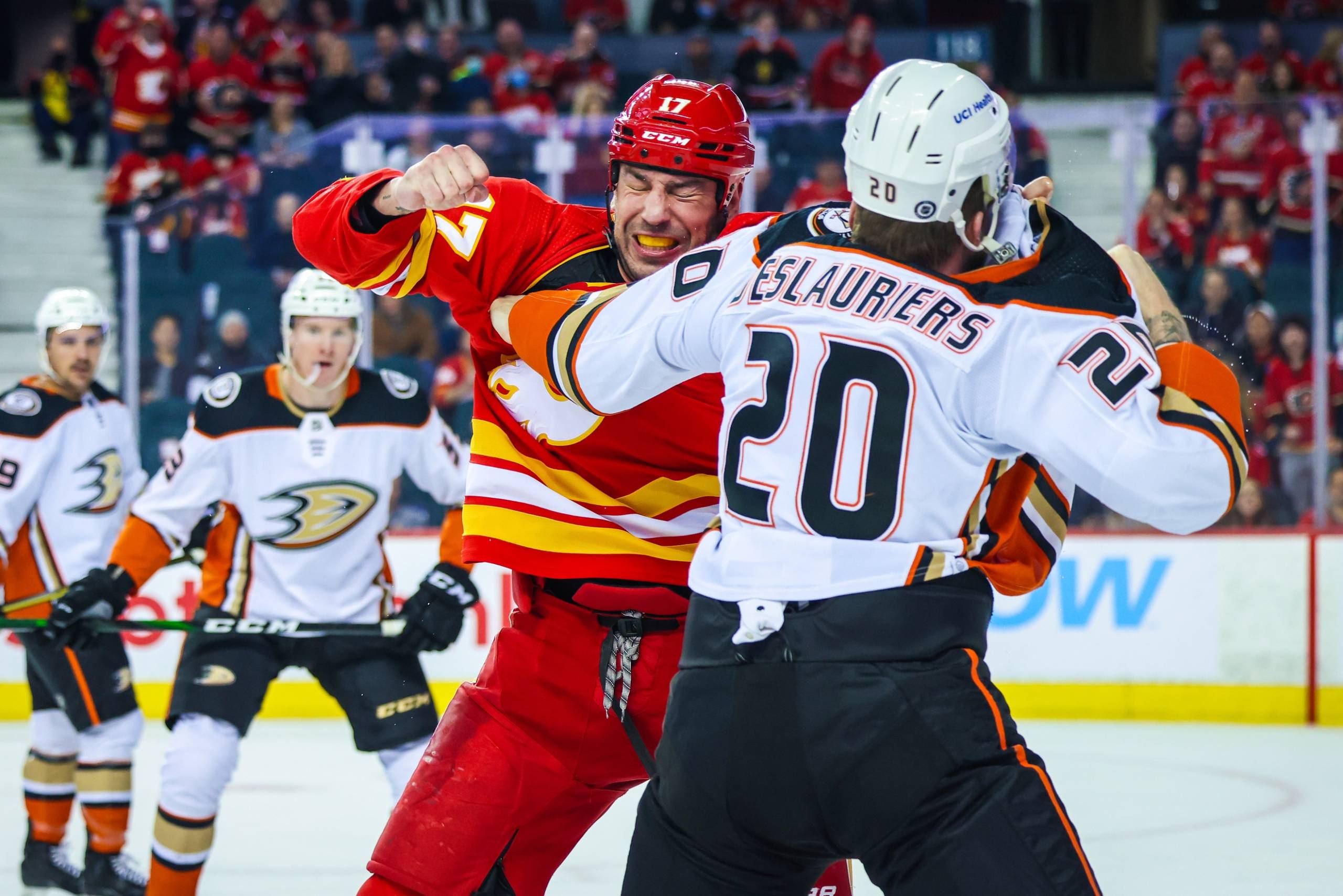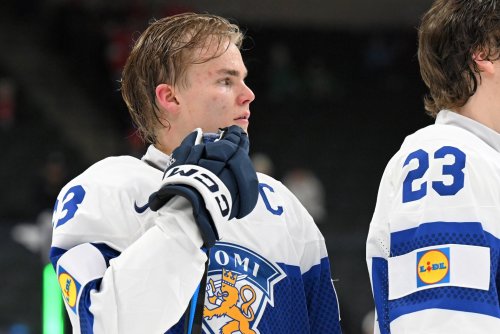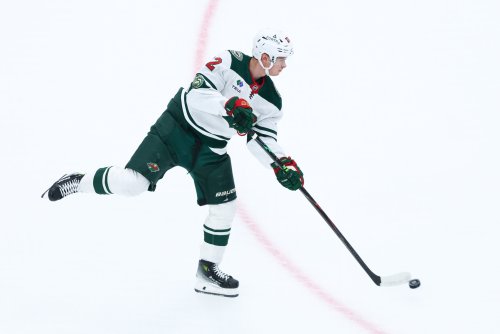
When Minnesota Wild general managers get desperate, they make costly mistakes. In 2018, Paul Fenton's bad first impressions of Nino Niederreiter caused him to flip Niederreiter at any cost. Chuck Fletcher followed up a Jonathan Toews torching by making the disastrous Martin Hanzal trade. Doug Risebrough watched Chris Pronger break Kim Johnsson's leg and responded by giving them a second-round pick for the honor of trading up three spots to pick tough guy Colton Gilles over Max Pacioretty.
One of the merits of Bill Guerin's strengths as a general manager has been never appearing desperate. His patience has already paid off on the trade market. Guerin didn't panic-trade a struggling Kevin Fiala or Joel Eriksson Ek in his first season. He patiently shopped Jason Zucker until finding a return to his liking. Even with his team in a tailspin, Guerin hasn't parted with major pieces or even called up his top prospect Marco Rossi. If anything, he might be patient to a fault.
But over the weekend, Guerin showed that he had it in him to overreact, trading a third-round pick for Nicolas Deslauriers.
Getting a tough guy for the playoff run is a rite of passage for NHL GMs. Playoffs come with added intensity, so it's pretty normal, if not always analytically sound, for players like Deslauriers to be in demand.
Dean Evason said the things that usually accompany such a move. "[He's] going to provide us with size and bite. Certainly, a guy that we've identified for a bit now that's a pain in the butt to play against." From Guerin: "He brings a physical nature to the game, leadership, sticks up for his teammates."
Reading all this, you'd think Deslauriers brings a new element to the team. The thing is, though, he doesn't. The coach and GM described a player profile that can fit nearly the Wild's entire bottom-six forward group.
It's well-known that Marcus Foligno, Jordan Greenway, and Eriksson Ek make for one of the strongest forechecking lines in the NHL. Of the 427 forwards with 300-plus 5-on-5 minutes, Foligno is 20th in hits per hour, Greenway is 47th, and Eriksson Ek is 102nd. They'd likely be higher, except their punishing style gives them the puck roughly 60% of the time.
The punishment doesn't stop at the third line, either. You could say Brandon Duhaime plays like a young Foligno, except that he's actually out-hitting the man called "Moose." Duhaime ranks 17th in the NHL in hits per hour. Even Nick Bjugstad and Connor Dewar throw their bodies around, ranking 77th and 100th, respectively. Early returns show they're no slouch in the possession department, either. In 27 5-on-5 minutes together, that trio out-attempted opponents 27-10.
So when did the Wild's bottom-six cease being a pain in the butt to play against? Why was a player like Deslauriers, who offers that element, but not any possession chops, so necessary?
You can draw a straight line from a few disastrous losses against Canadian teams. The Wild's swoon started with a 2-0 loss to the Winnipeg Jets. In that loss, Foligno, whose brutality usually colors inside the lines of the rulebook, lost his composure and earned his first suspension. Eight games later, the Calgary Flames ran Minnesota out of the Saddledome, out-hitting them 29-15 in a 7-3 loss.
That game still sticks in the craws of Wild fans who've grown impatient at the teams' struggles. It seems management is no exception, as they added toughness three weeks later. The next game was a 5-1 loss against Calgary, but Minnesota fought back in the physicality department this time, levying 48 hits to their 34. Despite the loss, Evason had a lot of praise for his team's toughness afterward. "Our goal scoring sucked. Everything else was great. Great. Our physicality was great, our commitment was great, we out-chanced them. Everything was great, but we didn't score goals."
It can be easy to get caught up in the physical battle, and it's not meaningless, but at the end of the day, hockey's about scoring goals and making sure you don't get scored on. What makes the Folignos and Greenways of the world valuable is they can give you the former without sacrificing a team's ability to dictate play.
With all due respect, Deslauriers only offers the former. That might offer some immeasurable quality to his team, but the stuff we can measure leaves much to be desired. Of 518 forwards with 2000-plus 5-on-5 minutes since Deslauriers entered the league, he ranks 491st in points per hour. He's crossed controlled over 50% of the expected goal share at 5-on-5 just once in his career — 50.02% in 2016-17.
The intangible elements don't appear to have much effect on his teammates, either. His teams have only scored more than 50% of 5-on-5 goals once in eight full seasons. In every season, his teams scored a lower percentage of goals than their expected goals would indicate. That is to say, they underperformed. At the very least, Deslauriers' presence didn't elevate his teammates.
We can put it this way: As much of a pain in the butt as Deslauriers might be to play against, Minnesota sure hasn't had a difficult time dispatching his Anaheim Ducks. Minnesota is 10-2-1 against them in Delsauriers's three seasons. By all means, argue that we can't expect a fourth-liner to be the difference between his team winning or losing.
But doesn't that put the lye to the logic in acquiring him in the first place?
The one compelling argument to adding a player like Deslauriers is to take the enforcer role off Foligno's list of responsibilities. Foligno is tied for fifth in the league with eight fights, which is a lot of time in the penalty box for such a valuable player. As Deslauriers put it Sunday, "I want him to be on the ice, I'll be in the box, I'll do the five minutes."
The only issue with that logic is, again, Minnesota already has someone who can do that. Last week, the Boston Bruins came to town for as physical of a game as the Wild played all year. They had a score to settle with Trent Frederic, who targeted and injured star Kirill Kaprizov in the previous game. Foligno didn't have to confront Frederic, however. Duhaime stepped up and had an old-school hockey brawl, leaving Foligno to focus on hockey.
As for Kaprizov, for whom the fight was meant to protect, he scored two goals in a win. A win whose game-winning goal came courtesy of Minnesota's physical, forechecking Eriksson Ek line. The Wild didn't miss Deslauriers' presence in this chippy, physical game against a Cup contender.
There are other nits to be picked in this trade. A third-round pick isn't much, but especially for a team that's been so careful with its draft capital, expending it on an enforcer-adjacent player is a big overpay. For now, this move is displacing Connor Dewar from the lineup. Dewar has impressed defensively and has a hard-nosed game that plays bigger than his 5'10" frame. New acquisition Tyson Jost flamed out of the Colorado Avalanche in part because they didn't give him skilled players to play with. Now he's skating with Duhaime, who flashes it only intermittently, and Deslauriers, who famously answered a question about his skills with, "What skill set?"
But really, the only thing that needs to be asked is: What problem does Deslauriers solve? They already had physicality, were tough to play against, and had a non-Foligno option to fight. Their perceived problems in those areas didn't emerge until one loss in Winnipeg and another in Calgary. They didn't have Matt Dumba, a vital defensive pillar, in the lineup for either game. One of those opponents likely won't make the playoffs; the other likely won't face Minnesota until the Conference Finals. How much value's gained making a move to counter them?
The third-round pick spent might never amount to even an AHL player, and the drop-off from Dewar to Deslauriers may not even be perceptible over 20-ish games. It still was an unwise move. The Wild have real problems facing them. The defense can't move the puck when Dumba, Jonas Brodin, or Jared Spurgeon are out. Last year, a nearly identical center group couldn't bring the offense in the playoffs. Getting Deslauriers took time, energy, and draft capital away from addressing those needs. All to address a problem nobody thought Minnesota had until three weeks ago.
Guerin usually operates the Wild with a steady hand, focused on long-term goals over short-term needs. That makes it all the more disappointing that he's made such a reactionary move. The Deslauriers trade is probably too low-stakes to have any real impact on the franchise, but it is the first time we've seen Guerin overreact to something. For the Wild to have success in the future, fans will have to hope this is a one-time stumble.
Think you could write a story like this? Hockey Wilderness wants you to develop your voice, find an audience, and we'll pay you to do it. Just fill out this form.







Recommended Comments
There are no comments to display.
Join the conversation
You can post now and register later. If you have an account, sign in now to post with your account.
Note: Your post will require moderator approval before it will be visible.